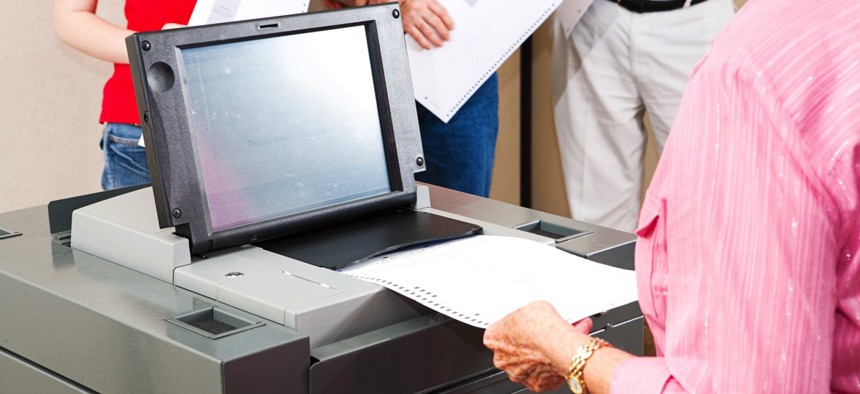Connecting state and local government leaders
“You want to assume breach,” the president of Verified Voting told the National Association of Counties this week.
WASHINGTON — The election policies in many U.S. counties haven’t been revised in years, and plenty of voting machines are still in service, beyond their intended life cycle. That’s concerning because voting technology is critical local government infrastructure when it comes to cybersecurity.
In 2010, a team of University of Michigan PhD students took near-complete control of a pilot system in the District of Columbia. That system allowed overseas and military voters to download and submit absentee ballots via the Internet. But within 36 hours of D.C.’s pilot system going live, votes were changed and secret ballots revealed during the test.
Last year, the Virginia State Board of Elections decertified a polling system used in 20 percent of precincts on Election Day 2014, after some electronic machines only let voters choose one particular candidate.
“[The] Risk is real,” Pamela Smith, president of Verified Voting, said Monday at the National Association of Counties’ Legislative Conference in the nation’s capital. “You want to assume breach.”
Voting systems should ideally never transmit actual votes over the Internet, Smith said, but if they do they must be robustly tested. A few hundred votes could make all the difference in a small jurisdiction.
The cities of Los Angeles, San Francisco, and Travis County, Texas, which includes Austin, are currently developing open-source voting systems that avoid the usual pitfalls.
Denial of service attacks on Internet-connected election systems could disenfranchise large numbers of voters.
Even systems for requesting ballots and registering voters are at risk, and not all counties are able to extend deadlines if there’s tampering.
State chief information officers are invaluable resources in protecting the servers and computers involved in elections, Smith said. She points to Oregon as an example of resiliency because the Beaver State’s remote ballot marking system maintains physical ballots for recounting and the state has election audits in place.
Paper might be old school, Smith added, but it’s reliable, and scanning technology has improved to the point where it can unskew the ballot of an overseas voter.
So what voting systems and policies are right for your county?
“You’re never going to find something that’s going to satisfy everyone,” said Thomas Hicks, the vice chairman of the U.S. Election Assistance Commission who will soon become that’s group’s chairman.
While residents in Oregon, Colorado and Washington state all vote by mail, that might not work in New Hampshire, for instance, Hicks said.
The EAC aims to give bipartisan recommendations to counties on everything from voting equipment to accessibility—hampered in recent years by state voter ID requirements—since its creation in 2002 to correct issues with the 2000 presidential election. Hicks hopes to have an updated poll workers training guide out in the next few months.
Though the EAC doesn’t test and certify voting equipment, its Voluntary Voting System Guidelines advise election policies be consistent with federal and state statutes, implementable, free of unanticipated costs, performance based, and technology neutral. The commission also pushes a common data format.
“It’s really hard to say what’s the lifespan of any existing voting system,” Smith said.
While she expects voters will soon be filling out sample ballots on smartphones, electronic verification of remote votes has a ways to go.
Successes with signature matching mean photo IDs aren’t necessary at the polls and are, in fact, a barrier for some to vote.
“I don’t think you necessarily need a driver’s license to vote or prove you are who you say you are,” Hicks said.
County officials looking to the EAC for funding to adopt emerging election technology shouldn’t hold their breath. While the commission gave about $3.2 billion during the past decade, the money dried up and might not be replenished unless there’s another debacle like the 2000 elections, where the results of the U.S. presidential race in Florida were unresolved for weeks.
“Voting has always been looked at as the fourth or fifth option in terms of the allocation of [federal] funds,” Hicks said.
Dave Nyczepir is a News Editor at Government Executive’s Route Fifty.

NEXT STORY: Zika Virus Exposes Weaknesses in Public Health




